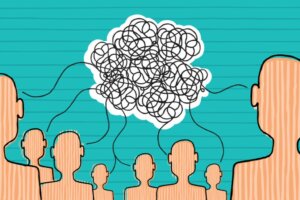The Difference Between Opinions and Knowledge

New information technology has become an integral part of our modern lives. Little by little, it has transformed our education and the way we learn. Today, the Internet is its own universe, and our use of the Internet on tablets, smartphones, and social media platforms changes and influences our opinions. But should we place so much value on everyone’s opinions? What’s the difference between opinions and knowledge?
At this point, the so-called “knowledge society” should be making good use of the vast and infinite information that the Internet provides. We should all be able to communicate better, have informed opinions, and reach higher levels of intellect.

Everyone has the right to their opinion, even if it’s based on bad information
Philosopher and writer Umberto Eco was a fervent critic of what he called, “the society of ignorance”. In his last book, From Stupidity to Insanity, he compiled a selection of newspaper articles that discussed society, the Internet, and the future of education and writing.
It’s an analysis of modernity from the perspective of the events themselves as well as the behavior of the protagonists. Eco talks about different news, TV shows, and political issues with a humorous and sarcastic tone.
“Social media gives legions of idiots the right to speak when they once only spoke at a bar after a glass of wine, without harming the community. Then they were quickly silenced, but now they have the same right to speak as a Nobel Prize winner. It’s the invasion of the idiots.”
-Umberto Eco-
The subtle difference between opinions and knowledge
Many experts have reflected on these two concepts. They might seem very similar, but if you dig a little deeper, they have significant differences. Because, while an opinion is usually based on solid knowledge, the terms are different. Classic philosophers such as Plato and even writers such as Kierkegaard have an important influence on contemporary thought about these subjects.
On one hand, Plato already made a distinction between these two terms in The Republic when he talked about a just society or city. Plato argued that those who were satisfied with superficiality (colors and shapes) never reached true knowledge. The person who can observe these shapes and figures and turns them into ideas, on the other hand, will understand their context.
“Opinion is the medium between knowledge and ignorance.”
-Plato-
Kierkegaard, the great thinker of the 19th century, argued in his book Two Ages that the only way to acquire knowledge is through silence. The philosopher proposed the idea that you first have to know how to listen, pay attention, and stay focused. Then, you have to go deep into the thought without giving your opinion.
In spite of the centuries of history and thought that separates these two thinkers, they set up a helpful framework for understanding the context we’re in today – our society of opinions. While it’s true that truth is often relative, knowledge, at the end of the day, is absolute. If you don’t value it, then you have to hold opinions and individual self-expression above pure knowledge.
“Only someone who knows how to remain essentially silent can really talk–and act essentially. Silence is the essence of inwardness, of the inner life.”
-Søren Kierkegaard-

Less talk and more silence so we can listen to those who know
This was the main argument of Manuel Gil Anton, professor at the Center for Sociological Studies at COLMEX (College of Mexico), in a discussion about educational reform last year. During the debate, the participants talked a lot about the importance of giving voice to those with the relevant knowledge. After all, they’ll be the ones with the best opinions. Only then can we have a more just society and a sense of collective well-being.
In 2012, Professor Charles Simic defined our society as “the age of ignorance” in the New York Review of Books. In his article, Simic talked about realizing how much of the population believed that Obama was Muslim. He concluded that we have “The rebellion of dull minds against the intellect. That’s why they love politicians who rail against teachers indoctrinating children against their parents’ values and resent the ones who show the ability to think seriously and independently”. He also said that “Stupidity is sometimes one of the greatest historical forces”.
All cited sources were thoroughly reviewed by our team to ensure their quality, reliability, currency, and validity. The bibliography of this article was considered reliable and of academic or scientific accuracy.
Ochagavía Toledo, M. (2010).Politeía — La República de Platón como obra de la filosofía. Disponible en http://repositorio.uchile.cl/handle/2250/108657
This text is provided for informational purposes only and does not replace consultation with a professional. If in doubt, consult your specialist.








